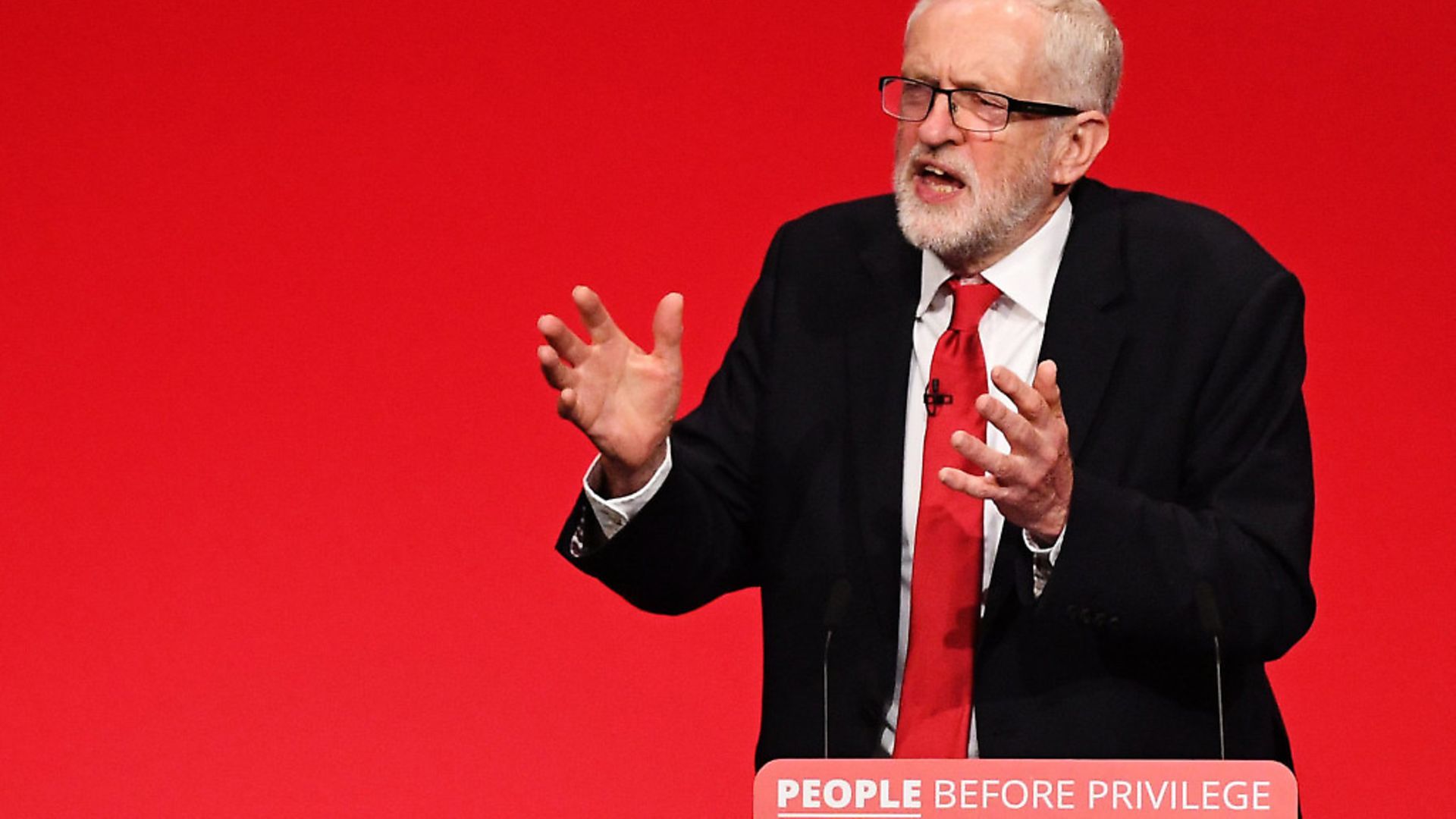
By relinquishing responsibility over Brexit, Labour’s leader has played into the hands of the party’s pro-EU wing, says ZOE WILLIAMS
As Jeremy Corbyn took to the stage at the close of the Labour Party conference, its end hastened by the usual circumstances of an active lawbreaker in Downing Street, he found himself explaining what his party had agreed on Brexit. “It’s not complicated,” he concluded irascibly. If you’re explaining, you’re losing, they always used to say. If you’re explaining, then you’re getting cross with people who didn’t understand your explanation, arguably you’re losing a little bit more.
Nevertheless, they have their answer: a general election, which Corbyn wins outright; a Labour-negotiated deal, within three months, which is essentially May’s deal plus worker’s rights, closer trading terms; or as we used to call it, not-even-BRINO. It’s all the hassle of Brexit, with none of the material differences.
Then, a referendum, in which a person could vote Leave or Remain, and still be proudly Labour, since their party, like a goodly parent, would choose no favourite. After that, a country returned to normal stuff like decency, the NHS, a functioning government, all that boring stuff we used to take for granted.
It’s actually not complicated in its words; it is only confusing in its logic. Why, when opinion is more and more polarised, would you offer the Leavers the milkiest possible Brexit and expect that to satisfy them?
There is so little thought put in to the rhetoric and priorities of the Leave camp, here, that it’s actually a little bit insulting. Why waste another three months negotiating this ‘Labour Brexit’, when the only thing left to unite the nation in any way is all of our ardent desire to stop talking about it?
Why refuse to come out as a Remain party, when your members, the bulk of your MPs, the leading lights of your shadow cabinet, are all calling out for it? How have you, the leader of the opposition, managed to emerge as the last man standing who doesn’t have a view, one way or the other? (I still have very profound doubts that Corbyn is the Brexiter everyone claims, beneath the surface; I think if you really examine his voting record, you’ll see him for what he is; cussed. Bloody stubborn. The more the world tells him that he can’t stay neutral on Brexit, the more resolutely neutral he stays. It would actually be quite funny, in a sitcom).
The answer to all these questions is the same: This policy doesn’t make sense in relation to Brexit, because it isn’t really about Brexit. It’s about loyalty to Corbyn, and taking all that fealty, all that “Oh Jeremy Corbyn” energy and trying to bottle it, so that it still has some value in a post-Corbyn world; it’s about stamping out challenge; standing up to the accursed mainstream media, and the rabble they have created, in the shape of remainiacs.
The first referendum was fought on the topic of Brexit, and won by people who never mentioned the details, and that was its tragedy. This Labour conference sent that into reverse, attempting to have a profound conversation about the future of the party, using only the words “Brexit” and “customs union”. It was well-understood by the delegates, but hopelessly perplexing to everyone else.
The Remain element of Labour put up a fight, in the shape of ‘motion 13’ on Monday afternoon, which called for the party to be unambiguously Remain. The chair, Wendy Nichols, thought from the show of hands on the floor that the motion had passed; Jennie Formby, the party’s general secretary, sitting next to her, asserted that it had not.
There were calls from the floor for a card vote, drowned out by a rather bellicose rendition of their song unto the leader (Oh! Jeremy Corbyn! – I’m genuinely worried that his successor will be chosen on the basis of whoever Len McCluskey favours whose name has the best Seven Nation Army scansion. Which obviously makes it Angela Rayner).
Plainly, if a vote is significant, and the results in any way unclear, then a person might suggest counting them in a systematic way. But there was also a subtext: even if the motion had still been shown to have been defeated, a card vote would have told us who went which way – the CLPs in favour of a Remain position, the unions against. If the Remainers could have proved that, they would still have had their ace in the hole: the grassroots did not want Brexit.
A party with aspirations to renewed internal democracy would, at some point, have to heed them. Getting bloc votes from the unions doth not internal democracy make. But they had a song instead.
In many ways, this is all less significant than it looks. The critical thing is that Labour backs a second referendum. They squander their own advantage, electorally, if they won’t pick a side, but with feelings running as high as they do, it is unlikely that Corbyn’s papal neutrality will put anyone off voting Remain.
Yet it is important in other ways. It illustrates the leadership focus, which is entirely inward, on keeping control within the party. The wider public, which prefers certainty and clarity, means squat in this delicate balance. More importantly, Labour Remainers now have permission to organise. Whether that’s Keir Starmer telling the Politico website that he had “mixed feelings” about conference’s outcome – surely the most rebellious thing he’s ever said – or the ground army, upon which Corbyn explicitly relies, for his electoral campaign.
The leadership basically used indecision as a cover for keeping control of their recalcitrant colleagues, and it prevailed. But the tactic will bite them when everyone who has made up their minds – which is everyone, let’s face it – takes that to the doorstep, and the media.
You cannot be disciplined, or even reprimanded for taking a view, when your party’s position is that all views are equally legitimate. This invites a ground operation that is both at odds with, and making much more powerful and heartfelt arguments than, the high command.
It is a delicious paradox that, in trying to stifle party democracy, they have actually given the membership and their possible challengers within the Parliamentary Labour Party, a huge amount of power; the freedom to make arguments they actually believe in.
Contrast that with Rebecca Long-Bailey’s absurd performance on Radio 4’s Today programme on Tuesday, in which she seriously asserted, with a painful lack of conviction, that it was good to stay neutral on Brexit because people change their minds a lot.
The other disadvantage of this intricate politicking is that it will probably cost Labour an overall majority in the election, which is looking more and more imminent. The voters they fetishise, those angry left-behinds of the north, more valuable than the chattering elite as a proverbial returning sheep is to Jesus, cannot stand this kind of dithering.
As one hard-Leave councillor from Barnsley, asked at conference what people would make of this new development, replied pithily: “‘t bollocks”.
In terms of the insights we can draw, for the weeks ahead – there are quite a lot of branches on this tree. My money is on Boris Johnson doing something or other so outrageous – ignoring the Supreme Court, the Benn Act, the deadlines (what was it his headmaster called him? “Cavalier”?) – that the order of events is surrendered to the lawyers.
When you need to decide whether to impeach or bring a charge of malfeasance in public office, when you need to know the respective legitimacy of an interim opposition-led government or a cross-party government of national unity, you need a Grieve or a Starmer far more than you need a cadre of people whose specialist subject is the finer workings of the NEC.
But if Johnson stays within the lines just enough to bring about the mid-November election which only a fortnight ago appeared so certain, Corbyn’s offer will be an unusual one: a kind of impassive, grandfatherly disinterest in the feud that’s tearing the family apart, with the promise that once they’ve finished fighting, they can all inherit (unless they’re ‘fat cats’).
The chances of a really strong, unifying opposition offer coming before the public in the next six weeks are remote. But it would be a mistake to underestimate just how badly the Conservatives can mess things up for themselves, with no help from the outside world at all.











